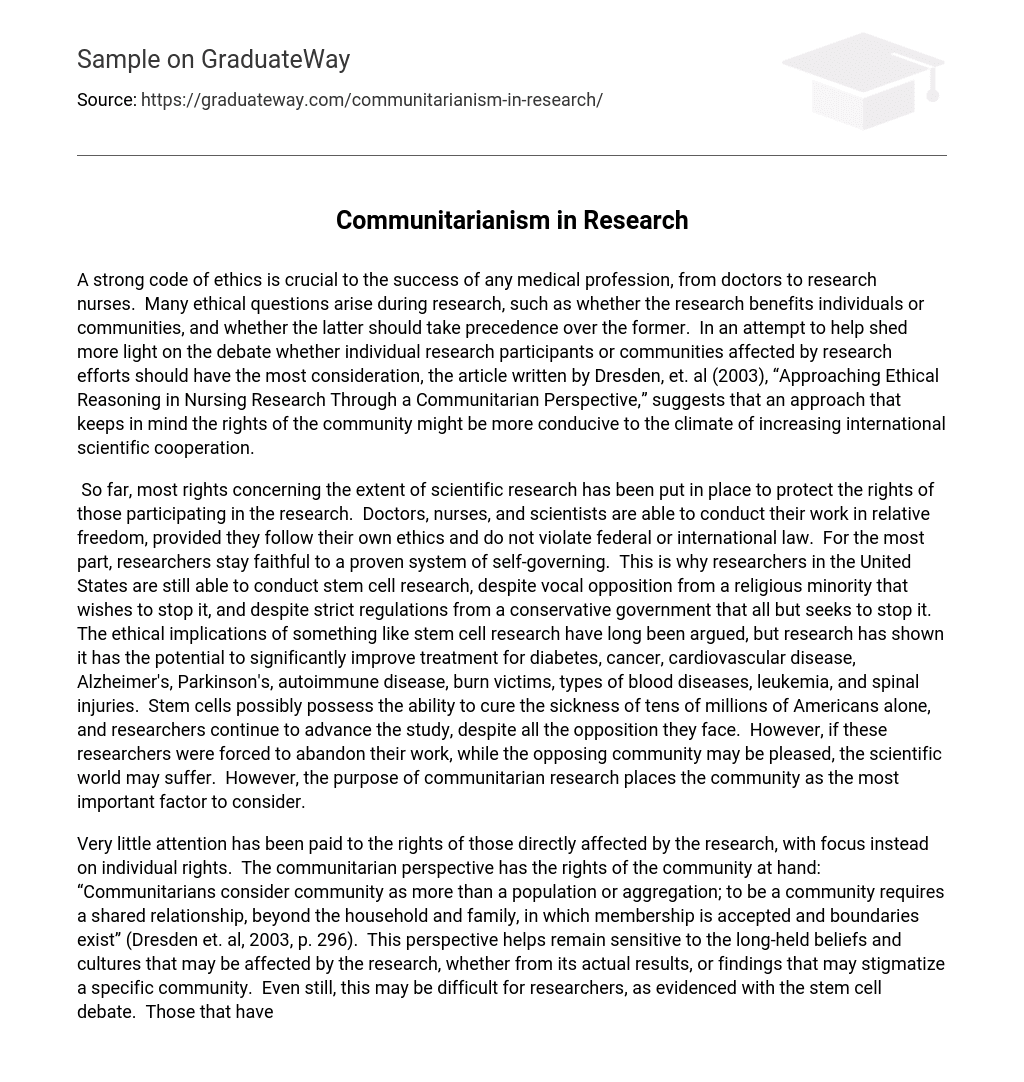A strong code of ethics is crucial to the success of any medical profession, from doctors to research nurses. Many ethical questions arise during research, such as whether the research benefits individuals or communities, and whether the latter should take precedence over the former. In an attempt to help shed more light on the debate whether individual research participants or communities affected by research efforts should have the most consideration, the article written by Dresden, et. al (2003), “Approaching Ethical Reasoning in Nursing Research Through a Communitarian Perspective,” suggests that an approach that keeps in mind the rights of the community might be more conducive to the climate of increasing international scientific cooperation.
So far, most rights concerning the extension of scientific research has been put in place to protect the rights of those participating in the research. Doctors, nurses, and scientists are able to conduct their work in relative freedom, provided they follow their own ethics and do not violate federal or international law. For the most part, researchers stay faithful with a proven system of self-governing. This is why researchers in the United States are still able to conduct stem cell research, despite vocal opposition from a religious minority that wishes to stop it, and despite strict regulations of a conservative government that all but seeks to stop it.
The ethical implications of something like stem cell research have long been argued, but research has shown it has the potential to significantly improve treatment for diabetes, cancer, cardiovascular disease, Alzheimer’s, Parkinson’s, autoimmune disease, burn victims, types of blood diseases, leukemia, and spinal injuries. Stem cells, possibly possess the ability to cure the sickness of tens of millions of Americans alone, and researchers continue to advance the study, despite all the opposition they face. However, if these researchers were forced to abandon their work, while the opposing community may be pleased, the scientific world may suffer. However, the purpose of communitarian, research places the community as the most important factor to consider.
Very little attention has been paid to the rights of those directly affected by the research, with a focus instead on individual rights. The communitarian perspective has the rights of the community at hand: “Communitarians consider community as more than a population or aggregation; to be a community requires a shared relationship, beyond the household and family, in which membership is accepted and boundaries exist” (Dresden et. al, 2003, p. 296). This perspective helps remain sensitive to the long-held beliefs and cultures that may be affected by the research, whether from its actual results, or findings that may stigmatize a specific community. Even still, this may be difficult for researchers, as evidenced with the stem cell debate. Those that have the many diseases that could possibly benefit from the research could be considered a community of their own, though in unconventional terms.
The problems that come with the communitarian perspective is figuring out just how to define a particular community. As stated in the article: “A group is a community to the extent that it encompasses a broad range of activities and interests, and to the extent that participation implicates the whole person rather than segmental interests or activities” (2003, p. 296). However, it is difficult for researchers to validate the existence of a community, especially when some are calling for requiring community consent to conduct research.
If research offers a unique opportunity to cure disease, to deny that possibility is to deny life to those that could be saved by advancements from that research. While communitarian proponents may believe the perspective will help to allow researchers to perform in the new world of international cooperation, though there are those that continue to criticize the view as naïve. Ideally, research is conducted with the best interests of all communities in mind, but for a community to have the power to deny research opportunities based on cursory knowledge stands the potential to become not only a detriment to science but to human progress itself.
References
- Dresden, E., McElmurry, B., McCreary L. (2003). Approaching Ethical Reasoning in Nursing
- Research Through a Communitarian Perspective. Journal of Professional Nursing, Vol 19, No 5 (September–October): pp 205-304.





